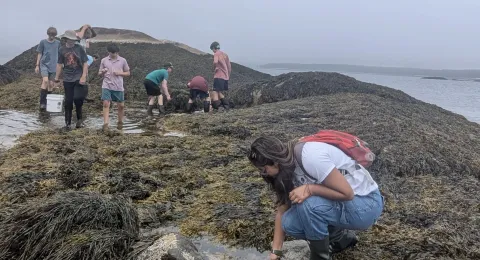
The Department of Agriculture, Nutrition, and Food Systems (ANFS) at the UNH College of Life Sciences and Agriculture is structured to study and strengthen the farm to fork to wellness connection. ANFS, which offers graduate degree programs in agricultural and nutritional sciences, is the only department of its kind in the country that spans this continuum.
Our graduate students work on a range of research topics spanning sustainable animal, vegetable and fruit production on one end of the continuum to human wellness on the other. Whether it’s breeding for high carotene content in vegetables, extending season length with high tunnels, or measuring the impact of high carotene diets on human health, our research is helping build a more sustainable food system.
Our goal is to prepare students for careers in nutrition- and agricultural-related fields, including employment in the public or private sectors, and/or for further academic advancement in research, teaching or professional specialization. Graduates of our program rejoin or start their own farms, join companies who work to serve those farms, work with communities struggling with food access, and conduct research with state, federal and international agriculture organizations.
Graduate Degree Programs
ANFS offers programs for students interested in a broad range of exciting and challenging careers spanning the farm to fork to wellness continuum. We offer four thesis-based graduate degree programs in nutrition and agricultural sciences. In addition, we offer two professional M.S. programs in nutrition: 1) a combined M.S. with dietetic internship, and 2) an intensive two semester M.S. in nutrition.
- Agricultural Sciences M.S. and Ph.D.
- Nutritional Sciences M.S. and Ph.D.
- Nutrition and Dietetics M.S.
- Nutrition M.S. (including the accelerated B.S./M.S. pathway for current UNH students)
Why choose UNH for your degree?
UNH is among the nation’s highest-performing research universities, having earned a Carnegie Classification R1. Our research portfolio brings in more than $110 million in competitive external funding each year. Federal and state funding supports research on diverse aspects of sustainable agriculture and associated underpinning life sciences as well as the translational effects of diet and human wellness.
Students have the opportunity to partner with state and regional growers and producers and collaborate with leading researchers worldwide. As a graduate student at UNH, you’ll have the opportunity to work in several top-notch teaching and research facilities, including the New Hampshire Agricultural Experiment Station, one of the university’s largest research organizations.
Our department brings together a strong and growing group of faculty representing diverse interests in nutrition and agricultural sciences. They conduct basic and applied research in nutrition, food systems, animal science, aquaculture, plant sciences, and agroecology. Specific areas of research available for graduate study include:
- Nutritional epidemiology
- Dietary risk factors of overweight and obesity
- Season extension for specialty crops
- Aquaponic food production
- Dairy cattle nutrition
- Organic dairy
- Ruminant nutritional physiology
- Environmentally and socially sustainable agriculture
- Floriculture
- Controlled environment agriculture (CEA)
- Agricultural engineering
- Plant physiology
- Plant nutrition
- Plant pathology
- Biological control of plant diseases
- Plant evolution and domestication
- Plant breeding
- Horticulture
- Aquaculture
For more research information, please visit our faculty biographies.
A limited number graduate research assistantships are available on a competitive basis from the Department of Agriculture, Nutrition, and Food Systems (ANFS) for highly qualified applicants pursuing one of our thesis-based graduate degree programs. Applicants with strong demonstrated intellectual merit and research experience are encouraged to apply to work with our faculty.
Because funding is limited and competitive, we encourage you to apply early. Funding decisions for the following academic year will commence beginning January 15th. Assistantships are generally awarded for one academic year (beginning in August) and may be renewed provided that funds are available and the student's academic performance, as well as performance in carrying out the responsibilities of the appointment, is satisfactory.
ANFS offers both teaching and research assistantships for students enrolled in the master’s and doctoral programs. Assistantships at UNH involve 20 hours per week of teaching or research effort during the academic year; students receive a tuition-waiver, a stipend, and the university’s student health plan. More information related to graduate assistantships at UNH can be found here.
In addition to the established research program in ANFS, we are specifically recruiting talented students to work in the following cutting-edge research programs in the farm-to-fork-to-wellness continuum.
Human nutrition, cardiometabolic risks, and the gut microbiota
Research in the Dao Lab focuses on human nutrition, obesity and its comorbidities, and the gut microbiota. We use a multi-disciplinary approach to identify biological and psychosocial targets for tailored lifestyle interventions for weight management and healthy eating. A primary focus is on populations that are disproportionately impacted by the obesity epidemic. There are diverse research opportunities for prospective students, ranging from data analysis of the gut microbiome in relation to dietary intake and clinical outcomes, to community-based research to identify lifestyle and psychosocial factors associated with overweight.
Contact: Dr. Carlota Dao
Dairy Cattle Nutrition
Research in the Erickson laboratory pertains to optimizing production of colostrum through manipulating dairy cow nutrition and colostrum’s subsequent utilization by the calf. The effects of water-soluble vitamin supplementation in dairy cow diets on colostrum production and on ruminal development in the calf is currently being studied. We are also studying the unique characteristics of the Jersey cow in her ability to produce colostrum. Other research has focused on alternative feeds for growing heifers along with feed additives and their effects on ruminal development and protozoal disease incidence. We continue to study alternative ingredients in cow diets to help dairy producers reduce their costs of feeding. If this research interests you, consider reaching out to Dr. Pete Erickson.
Specialty Crop Improvement
The flavorful and nutrition-packed kiwiberry is an emerging specialty crop in the northeast and globally, and UNH has the only research and breeding program in the country dedicated to its systematic improvement. Trait development, genetics, horticulture, post-harvest physiology, nutrition and marketing are among the research areas, and as an ANFS graduate student, you can play an important role in our progress. If applied research on a new specialty crop for our region’s producers and consumers appeals to you, check out the research program of Dr. Iago Hale and consider applying to our M.S. program in Agricultural Sciences.
Contact: Dr. Iago Hale
Cucurbit Breeding and Genetics
The UNH cucurbit breeding program conducts breeding efforts primarily in squash, pumpkins, and melons. The research program seeks to understand the genetics of important stakeholder traits such as marketable yield, disease resistance, nutritional quality, and appearance. In order to meet breeding and research objectives, we employ traditional breeding and genetics methods alongside modern statistical, computation, and genomics tools. Plant breeding is a broad, interdisciplinary endeavor. As such, students in the program will gain expertise in a wide variety of areas tailored to their research interests.
Contact: Dr. Christopher Hernandez
Program website: Cucurbit Breeding & Genetics at University of New Hampshire
Promoting Healthy Eating in Early Childhood
Research in the Mena Lab focuses on child nutrition and promoting healthy lifestyle habits at home and in early care and education (ECE) settings. A primary focus is on children under the age of 6 and families disproportionately impacted by obesity and food insecurity (risk). We use a socioecological approach to identify targeted approaches for enhancing home-ECE environments to support the development of healthy eating habits in early childhood. There are a variety of research opportunities for prospective students, ranging from data analysis of diet quality in relation to home-ECE concordance of food and nutrition environments and health outcomes, to community-based research to identify home-ECE factors associated with diet quality and chronic disease risk in pediatric populations.
Contact: Dr. Noereem Mena
Controlled Environment Agriculture
Dr. Rahman's EAE Lab works on climate-smart technological implications for semi-controlled and controlled environment agriculture. Being a multi-disciplinary lab, EAE lab tries to overcome each specific challenge of controlled environment agriculture (CEA), from the substrate to the roof cover and anything in between, through sustainable technologies. Their research areas include but are not limited to sustainable HVAC technology development, substrate development, energy, and water optimizations for CEA. EAE lab always welcomes novel ideas and enthusiasm for research toward CEA.
Contact: Dr. Md Sazan Rahman
Precision Dairy Management
Research in the Seely lab is focused on the integration of dairy cow biology and precision livestock technologies. With a specific emphasis on epidemiological methods, our research aims to optimize and validate technologies to improve dairy cattle health, well-being, and productivity. Areas of research include the exploration of rumination and activity collars to detect early lactation disease as well as novel sensor development to optimize calf health.
Contact: Dr. Claira Seely
Specialty Crop Production and Season Extension
The Sideman Lab takes an integrated approach to research and extension activities that focus on high-value specialty crop production and methods of extending the growing season for New Hampshire farmers. We are particularly interested in researching strategies to minimize production costs and ecological impacts, while producing economically viable yields of high-quality crops. Recent projects have focused on identifying new crops, cultivars and production practices, including season extension technologies, that expand opportunities for vegetable and berry production in northern New England.
Contact: Dr. Becky Sideman
Decoding Tomato Ripening: Exploring the Genetics of Fruit Softening
Tomato is one of the most economically important horticultural crops, contributing significantly to both fresh and processed markets. However, tomatoes have a short shelf life, making them vulnerable to postharvest losses throughout the food supply chain. Softening, a ripening-associated process, plays a key role in determining postharvest quality, including shelf life and disease resistance. Due to its well-studied genetics, abundant resources, short life cycle, and efficient transformation system, tomato serves as an ideal model for studying fruit softening in climacteric fruits. Insights from tomato research are also applicable to other fleshy fruits. Controlling softening while preserving essential quality traits like flavor is crucial for fruit quality and the food supply chain. The lab integrates molecular genetics, bioinformatics, and genomics to tackle key unresolved questions in the field. Students in the program will develop a strong foundation and gain practical experience across a variety of discipline. The lab is seeking highly motivated graduate and undergraduate students to join our research team.
For more information or to inquire about opportunities, please contact:
Dr. Duoduo Wang: Duoduo.wang@unh.edu





